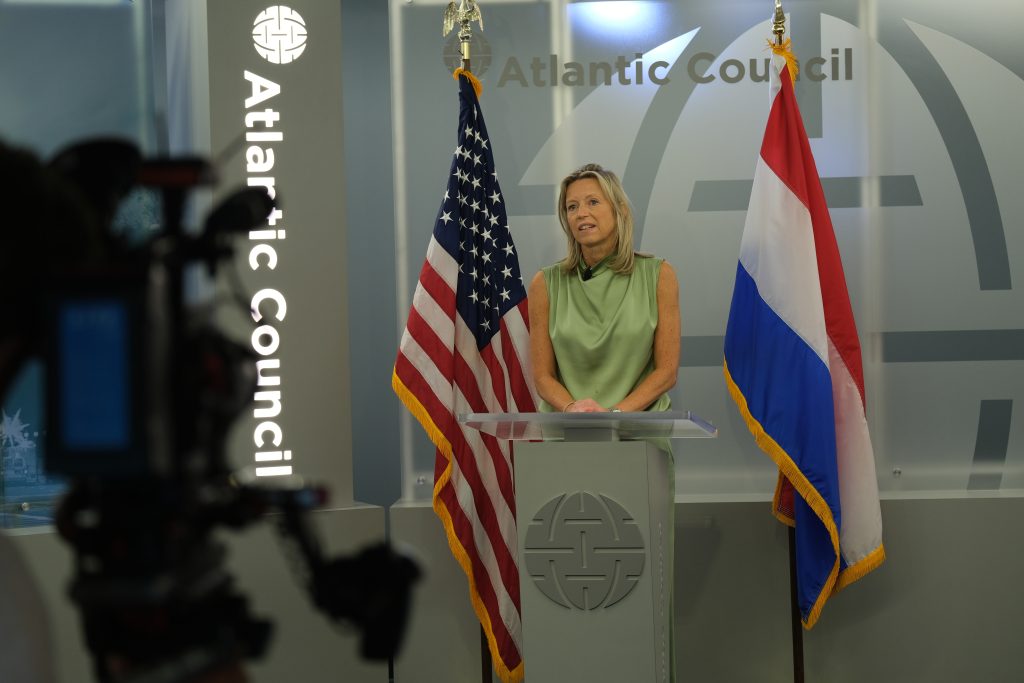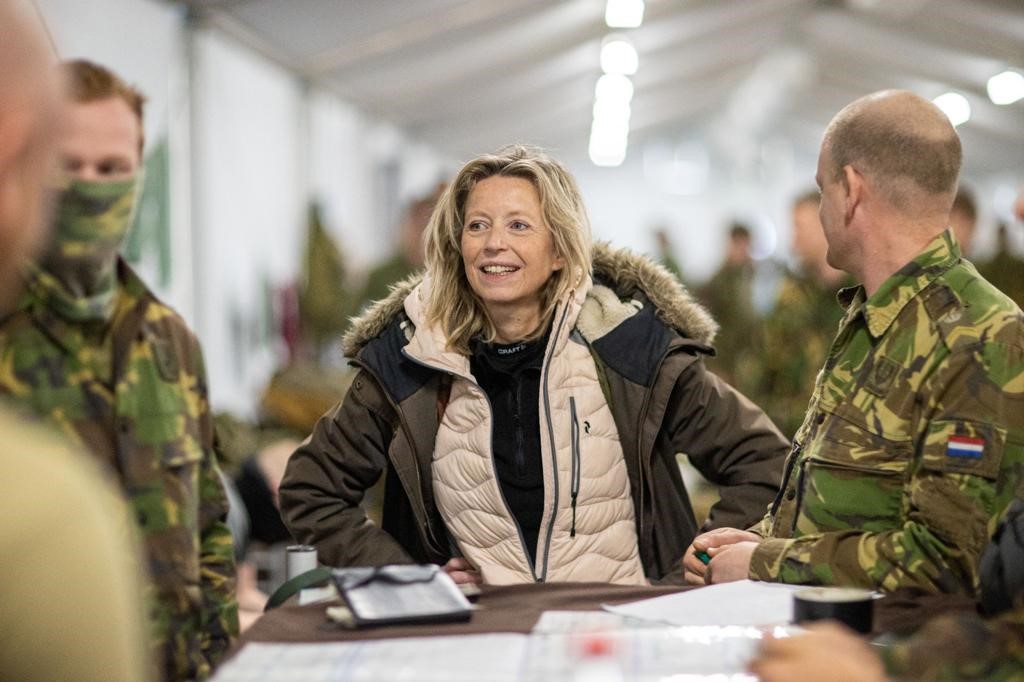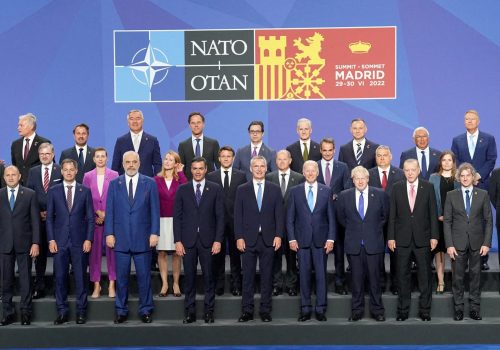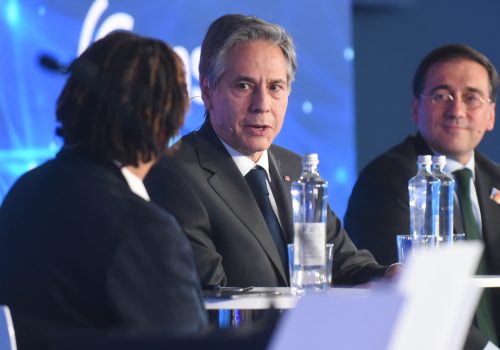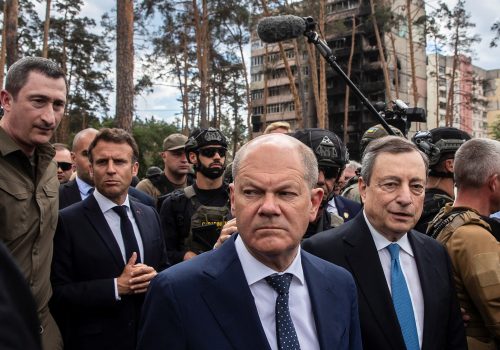Watch the full event
Speech transcript
Remarks as delivered
Speaker
H.E. Kajsa Ollongren
Minister of Defense, Kingdom of the Netherlands
Thank you for your kind introduction. It’s an honor to be here today at the Atlantic Council and to share some thoughts with you.
I think our countries share a thirst for liberty, and in our histories we [will] find many similarities.
People all over the world risk their lives to fight for freedom in their own countries – and if they don’t succeed, they are willing to flee their homes to find freedom elsewhere.
My family history is a testimony of exactly that.
My grandfather was a young officer in the Czarist army. He was born in Kyiv, which was, then, at that time part of Russia. He descended from an old Swedish-Finnish family and became Russian through the annexation of Finland in the nineteenth century. He fled his country during the Russian Revolution, and he ended up in the Dutch East Indies.
And my father came to the Netherlands after the Second World War also in the hope of a better life.
Being forced to flee from violence and aggression and seeking freedom elsewhere: history repeats itself.
It strengthens my conviction that we have to do everything in our power to protect what we value, together.
Some would say that the bond between the United States and the Netherlands began with gunpowder. American revolutionaries fought with Dutch gunpowder, purchased from us in 1774.
Others would say it began in 1776, when the Netherlands was the first to acknowledge the sovereignty of the United States, with a “first salute” to the flag on the American vessel the Andrew Doria, fired from cannons stationed on the Dutch island of St. Eustatius in the Caribbean. Our countries’ [militaries] continue to cooperate closely on regional security in the Caribbean until this day.
I took this short dive into our histories as a bridge to discussing our present.
Because we are all rooted in history—in that of our families and of our countries. But also because this teaches us that individual liberty is a concept that unites the USA and the Netherlands. Every year, on the 5th of May, the Netherlands celebrates its liberation from Nazi-German occupation in 1945. A liberation that American forces were an essential part of.
Liberty is one of the core values the Ukrainian people are fighting so hard for today—and it’s a fight that frightens Putin.
He fears liberty; he fears democracy. Since the fall of the Berlin Wall and the end of the USSR, he has developed a ruthless obsession to travel back in time—as far back as the Russian empire.
While most Europeans look forward, drawing lessons from history for a more secure and more prosperous future, Putin looks back to the past; he’s “tsar-struck” by Peter the Great. There have been warning signs, of course: Putin’s Munich speech, his five-day war in Georgia, his swift annexation of Crimea.
But despite these warning signs, Russia’s imperialist war came as a surprise to many Europeans. But it shouldn’t have. We should have thought the unthinkable.
We were warned by the intelligence community of the massive build-up of Russian troops. In particular, the US and UK intelligence services went public in extraordinary detail. While those efforts failed to deter Putin’s invasion, [they] strengthened transatlantic resolve and allowed swift decisions on sanctions against Russia and support for Ukraine.
For Europe, the invasion of Ukraine was a watershed moment. Putin’s aggression has brought us closer together and has reminded us Europeans that freedom and security cannot be taken for granted. That hard power is a prerequisite for European security.
European countries are now upping their defense budgets, Sweden and Finland are joining NATO, Denmark has joined the EU’s defense cooperation and the EU is providing billions of euros in military aid to Ukraine.
In 1631, the French philosopher Descartes, who lived in the Netherlands for most of his life, wrote the following about Amsterdam: “In what other country could you find such complete freedom, or sleep with less anxiety, or find armies at the ready to protect you?”
His juxtaposition of “freedom” and “armies to protect you,” is striking. After the end of the Cold War, many expected Russia to become a true partner. In only 2006, the Russian navy ship Pitliviy flew the NATO flag as part of a NATO naval force in the Mediterranean. Now, it has become necessary to rebalance soft and hard power—and that is going to take time.
Nevertheless, I come here with an ambitious message. The Netherlands, a country that has liberty in every fiber of its being, is strengthening its defense. And not only that, we are also working together with allies and partners, to become stronger together.
First, by helping Ukraine to win this war. Admiring their fierce resistance is not enough.
Ukraine can prevail, with our help. Russia must not win this war.
The stakes are high for the whole world. The cards are being reshuffled. We’re grateful to the US for initiating the Ukraine Defense Contact Group, in order to ramp up military support to Ukraine and to make sure support stays at the top of the political agenda.
Second, by getting European defence in order. The NATO Summit of two weeks ago was a historic demonstration of Transatlantic unity.
Today, a long list of countries lives up to the 2 percent of GDP commitment. The Netherlands will spend 2 percent of GDP on defense in 2024, as pledged in Wales. It’s a 40 percent increase.
Last month, I presented our Defence White Paper outlining how we will invest in our forces.
Europe must get its act together. European countries need to do more, they need to do more together and they need to be able to act, without the United States, and to hold our own if necessary. We talk a lot about European defense… but what does it mean? It doesn’t really mean collective difference, let me state that first, because that’s what NATO is all about and that’s what NATO is for. Within NATO, European countries need to provide more capabilities and have more forces at high readiness.
We Europeans also know that we need to do more ourselves. And that’s what European defense does mean. Now is the time to work together on joint development and smart procurement. To have not only more but better capabilities to improve interchangeability, to improve standardization. That will make us better partners in the Alliance.
The Netherlands stands ready to lead on international defense cooperation in order to tackle the challenges that we face together. And we are working hard to further bolster our position as your gateway to Europe. Taking the lead on military mobility in Europe, providing host nation support to US troops, and brokering US-EU cooperation.
And we, as Europe, need to do more on our own, with regional partners – and yes, once again, if necessary, without the United States. With our European military capabilities and the legal and economic instruments of the EU, we have the ideal mix of tools already at our disposal. As a wealthy economic bloc, we should be able to take greater responsibility for security threats in and around the European theatre and beyond. At the Shangri-La Dialogue in Singapore last month, I reiterated the Dutch commitment to stability and security in the Indo-Pacific. We played an important role instigating the European Indo-Pacific strategy that led to a more coordinated and structural European naval presence in the Indo-Pacific.
So by stepping up to the plate by strengthening European defense and reinforcing cooperation between NATO and the EU, we will further strengthen NATO and the European defense. And we’ll do that in our transatlantic security partnership as the United States has been asking us to do for some time.
So both in terms of defense investment and in terms of deployment, the Netherlands will work with the US, with NATO, with the EU, and with European partners. The US can count on the Netherlands as a trusted and capable defense partner.
In closing, Europe has woken up to the idea that security is not a given. And that there is not just one threat—there are multiple. The war in Ukraine, China’s assertiveness, a global hunger crisis, climate change, [to] name only a few.
We will contribute to a united response in defending the international rules-based order, together with our global partners. We have to show and tell that freedom will triumph in all corners of the world. We can do so concretely today, by putting the spotlight on the fact that the looming food crisis is the fault of Putin alone. The announcement yesterday by the Secretary-General of the United Nations on getting grain out of Ukraine is reason for some optimism. The ball is in our court now to demonstrate through our actions that “might does not make right” and that we can help solve this crisis. That it pays off to play by the rules. Only through our results, however, will we be able to lure in countries on or beyond the tipping point back in the democracy camp.
There is a lot at stake. We are facing a diverse, complex, and increasingly concerning strategic environment.
It is up to us to make the right decisions so that we can pass on liberty and peace to the next generations.
To paraphrase Descartes, we have to do this by striving for complete freedom, with armies at the ready to protect us—and to that, I would add, it needs to be a concerted effort.
Today, I live in the city that has served so many as an inspiration for liberty: Amsterdam.
I carry my family’s past with me, in my name and in my ambitions as Minister of Defence during these troubling times. Today, Kyiv, my grandfather’s birthplace, is a free city in a country under siege. Finland and Sweden will become NATO Allies very soon. The Netherlands already ratified this week. As a founding member of both the EU and NATO, the Netherlands will continue to play its international role to pass on peace to the next generations.
It’s up to us to leave the world in better shape for future generations.
Thank you, General. [I] thank the audience.
I’m sure that there’s a lot more to discuss and I look forward to your questions on these topics.
Watch the full event
Related program

The Transatlantic Security Initiative, in the Scowcroft Center for Strategy and Security, shapes and influences the debate on the greatest security challenges facing the North Atlantic Alliance and its key partners.
Subscribe for events and publications on transatlantic security
Sign up for updates from the Atlantic Council’s Transatlantic Security Initiative, covering the debate on the greatest security challenges facing the North Atlantic Alliance and its key partners.
Further reading
Thu, Jun 30, 2022
Our experts decipher NATO’s new Strategic Concept
Markup By
What were the allies really saying amid all the jargon? And what did they leave out? Our experts carefully combed through the document and dropped their insights in the margins.
Wed, Jun 29, 2022
Blinken: NATO is ‘more united, more focused’ after historic summit
New Atlanticist By
The Atlantic Council teamed up with civil society organizations at the NATO Public Forum, convening top US and global leaders for their take on NATO's priorities in a changing security environment.
Thu, Jun 16, 2022
How NATO can stick together and keep the pressure on Russia, according to four former Alliance chiefs
New Atlanticist By Katherine Golden
Four former NATO chiefs gathered at the Atlantic Council to weigh in on the Alliance's response to the war in Ukraine, enlargement, and the next plays in its playbook.
